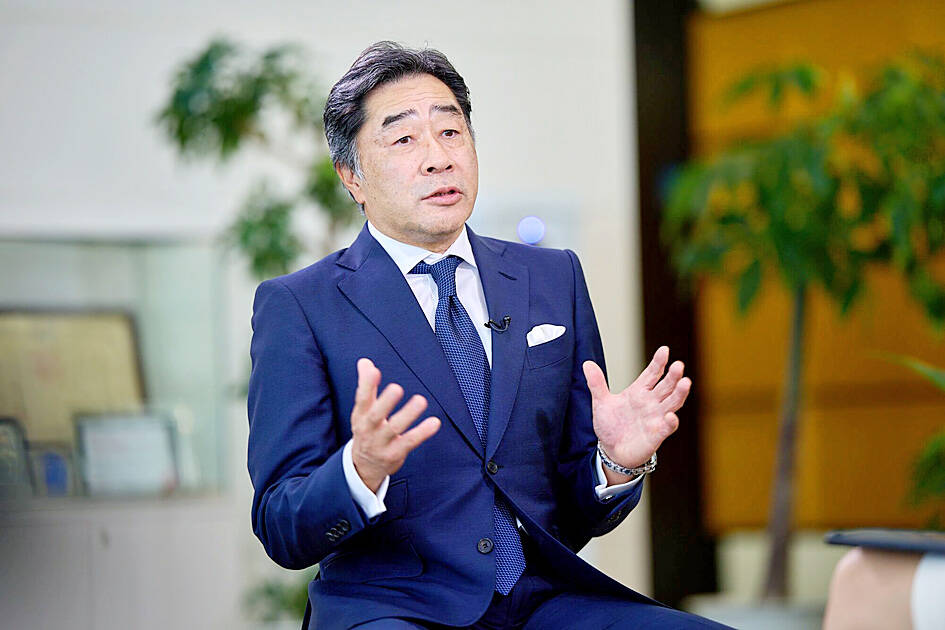Tokyo Electron Ltd is seeking to build a team of chip engineers in India to take advantage of the push by Indian Prime Minister Narendra Modi’s government for more semiconductor manufacturing in the world’s most populous country.
Japan’s biggest chip equipment maker plans to hire and train local engineers in or around 2026, with their first task to provide technical services to Tata Electronics Pvt, Tokyo Electron chief executive officer Toshiki Kawai said.
Robotics would play a growing role and local staff would be provided with in-person and remote support from Japan, he added, declining to specify how many people the company would need to hire.

Photo: Bloomberg
India is amping up efforts to attract international electronics companies and chipmakers to set up facilities within its borders, under a plan by the Modi administration to close the tech gap with advanced economies.
Apple Inc is accelerating its production and sales of iPhones in the country, while Tata Group and others are investing billions of dollars in semiconductor fabrication plants.
The government is providing incentives to support those ventures, which would need machinery and know-how from companies like Tokyo Electron.
The Tokyo-based company has set a target of 10,000 new hires globally over the next five years, as more countries race to build chips at home. Tokyo Electron supplies equipment to Taiwan Semiconductor Manufacturing Co (台積電), Samsung Electronics Co, SK Hynix Inc and Intel Corp, and its forecast for the business year to March points to record revenue and operating profit.
It also expects overall chip demand to double by 2030, boosted by artificial intelligence, autonomous cars and a push toward energy efficiency and decarbonization.
That is even as the US pressures Japan to further tighten restrictions on exports of advanced chipmaking gear to China, part of an extended effort to curb its technological progress.
US officials have sought to limit Tokyo Electron’s ability to service some of its machines in China and have talked of invoking the foreign direct product rule, which allows Washington to control sales of products made anywhere in the world if they use even a small amount of US technology.
Such moves would not affect global appetite for chipmaking machines, 61-year-old Kawai said.
“The importance of semiconductors remains unchanged. There will always be investment somewhere,” he said.
Tokyo Electron said earlier this month it would help train Tata Electronics’ workforce on chip-making equipment and support its research and development.
Modi’s administration has so far approved more than US$15 billion of semiconductor investments, including US memorychip maker Micron Technology Inc’s plan for a US$2.75 billion assembly facility.
Israel’s Tower Semiconductor Ltd is also seeking to partner with Indian billionaire Gautam Adani on a US$10 billion fabrication plant in western India.
Sales to China, which surged to about 50 percent of Tokyo Electron’s revenue in the June quarter, would likely fall to less than 40 percent in October-March, and comprise about 25 percent to 30 percent in the future as overall sales of equipment rise, Kawai said.
“India won’t replace the Chinese market. It would be growth in addition to China,” he said.

CHIP RACE: Three years of overbroad export controls drove foreign competitors to pursue their own AI chips, and ‘cost US taxpayers billions of dollars,’ Nvidia said China has figured out the US strategy for allowing it to buy Nvidia Corp’s H200s and is rejecting the artificial intelligence (AI) chip in favor of domestically developed semiconductors, White House AI adviser David Sacks said, citing news reports. US President Donald Trump on Monday said that he would allow shipments of Nvidia’s H200 chips to China, part of an administration effort backed by Sacks to challenge Chinese tech champions such as Huawei Technologies Co (華為) by bringing US competition to their home market. On Friday, Sacks signaled that he was uncertain about whether that approach would work. “They’re rejecting our chips,” Sacks

Taiwan’s exports soared 56 percent year-on-year to an all-time high of US$64.05 billion last month, propelled by surging global demand for artificial intelligence (AI), high-performance computing and cloud service infrastructure, the Ministry of Finance said yesterday. Department of Statistics Director-General Beatrice Tsai (蔡美娜) called the figure an unexpected upside surprise, citing a wave of technology orders from overseas customers alongside the usual year-end shopping season for technology products. Growth is likely to remain strong this month, she said, projecting a 40 percent to 45 percent expansion on an annual basis. The outperformance could prompt the Directorate-General of Budget, Accounting and

NATIONAL SECURITY: Intel’s testing of ACM tools despite US government control ‘highlights egregious gaps in US technology protection policies,’ a former official said Chipmaker Intel Corp has tested chipmaking tools this year from a toolmaker with deep roots in China and two overseas units that were targeted by US sanctions, according to two sources with direct knowledge of the matter. Intel, which fended off calls for its CEO’s resignation from US President Donald Trump in August over his alleged ties to China, got the tools from ACM Research Inc, a Fremont, California-based producer of chipmaking equipment. Two of ACM’s units, based in Shanghai and South Korea, were among a number of firms barred last year from receiving US technology over claims they have

BARRIERS: Gudeng’s chairman said it was unlikely that the US could replicate Taiwan’s science parks in Arizona, given its strict immigration policies and cultural differences Gudeng Precision Industrial Co (家登), which supplies wafer pods to the world’s major semiconductor firms, yesterday said it is in no rush to set up production in the US due to high costs. The company supplies its customers through a warehouse in Arizona jointly operated by TSS Holdings Ltd (德鑫控股), a joint holding of Gudeng and 17 Taiwanese firms in the semiconductor supply chain, including specialty plastic compounds producer Nytex Composites Co (耐特) and automated material handling system supplier Symtek Automation Asia Co (迅得). While the company has long been exploring the feasibility of setting up production in the US to address